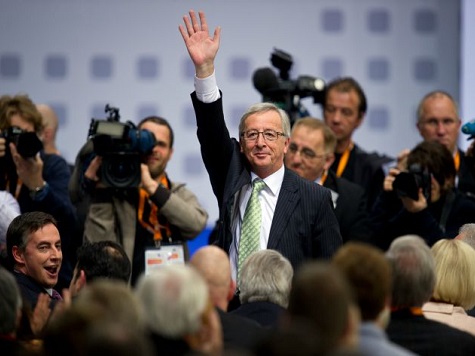It has often been said that Cameron is at his best when his back is to the wall. He thrives in a crisis, but seems less sure footed when the stakes aren’t so high. Yet in the face of the post European Elections round of EU negotiations this talent has disappeared faster than Lib Dem voters at a by-election.
So what on earth has happened to this talent over the post European Elections round of EU negotiations? Dave’s ongoing battle over the would-be President of the European Parliament, Jean-Claude Juncker, rages on, but why is he so quixotic when it seems clear he is going to lose and when it uses up all of his small stock of European political capital?
Cameron is engaging in what can only be described as a subtle-as-a-foghorn-in-a-cloister approach to the selection of the next EU President. Seasoned EU watchers, both journalistic, political and more importantly corporate are watching the resulting cacophonic din aghast.
Cameron robustly defended his campaign to stop Juncker during PMQs this week. He framed his argument in terms of principles and – for once – made the constitutional argument rather than focussing on Juncker’s pedigree as a dirty federalist. It is not correct for the Parliament to select the President of the Commission; it is and should remain a job for the national political leaders through the European Council.
Everything he said was accurate but he failed to mention the elephant in the room – that, if appointed, the process by which Juncker is likely to become President of the European Commission is, in Cameron’s own reported opinion, tantamount to treaty change without IGC (international governmental conference).
Essentially, the European Parliament has wrested control of the process by which the European President is selected; this goes against the Treaty of Europe and by Cameron’s own promise this should trigger a referendum.
The European Parliament is playing fast and loose with the terms of the Treaty. When the Lisbon Treaty went through the European Parliament, in a move driven by the former Lib Dem MEP Andrew Duff, the meaning of Article 17.7 – which states that the Council proposes the Commission President and the Parliament has the power veto and rubber stamp – was changed.
Under the SpitzenKandidaten process, the Parliament now proposes the President and the stamping is left to the Council; a fundamental and revolutionary change that is going entirely unnoticed in all countries bar Germany.
What this means is that the power has moved from the nation states in the European Council to the federal European Parliament. It is a direct transmission of power from the nations to Brussels and by Cameron’s own promises, and also according to the 2011 European Union Act, the famous ‘Referendum lock’, this should trigger a referendum, much to Cameron’s chagrin as this would fall before next year’s General Election.
He needs the referendum carrot to coax back wayward UKIP voters; he needs it to ensure re-election. A referendum now would scupper his plans and one can only speculate that he is hoping to God that nobody – as nobody in the British press appears to – notices just what is currently happening.
To quote, in November 2009, Cameron said “never again should it be possible for a British government to transfer power to the EU without the say of the people”; this became law in 2011, following the Coalition Agreement, to ensure that there will be no further transfer of sovereignty, areas of power or competences over the course of this parliament.
This is a bona fide, clear cut example of powers being transferred from the nation state, operating through the European Council, to the European Parliament and yet when Cameron speaks in our Parliament he fails to mention this key battle.
And there is no way that Cameron does not know this. Brussels sources whisper that during a European Council working dinner with other heads of state on the 27th May Cameron did not push the public line that Juncker is a dreadful federalist, he pushed the constitutional line; he is very aware that if this becomes public knowledge there may well be a push for a referendum before the next General Election, severely threatening his chances of re-election.
Cameron, like a sensible general, has chosen his referendum battlefield. It is to be in 2017, after he has wrested a couple of small concessions from Brussels that he can present to the grateful public as a great victory. The last thing he needs is a referendum on an issue where he has lost, i.e. when Mr Juncker becomes President over his head and against his very public wishes due to a non-Treaty Treaty Change which strips the nations of key powers.
If Juncker is elected, which he will be, having garnered the support of each group aside the Conservative’s ECR and UKIP’s EFD, Britain will lose, almost certainly for good, one of the few key powers retained by the Council of nations.
This is happening under the noses of the British people and press and is being kept quiet by our Prime Minister in a desperate bid to avoid a referendum under any terms but his own. This once again illustrates Cameron’s self interest and dishonesty, and fundamental weakness; he has not listened to the results of the recent election and remains a committed Europhile.
If you consider it alongside his inability to control his own MEPs, two of whom, we are told, voted in favour of Germany’s Alternative für Deutschland Party joining the ECR against Cameron’s command (my money is on Hannan and Kamall), how on earth can we expect him to act in Britain’s interests and lead Europe wide reform?

COMMENTS
Please let us know if you're having issues with commenting.